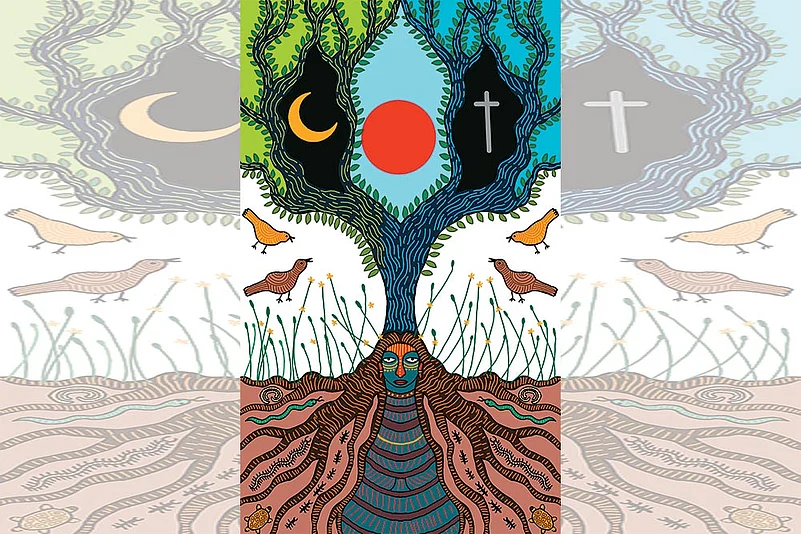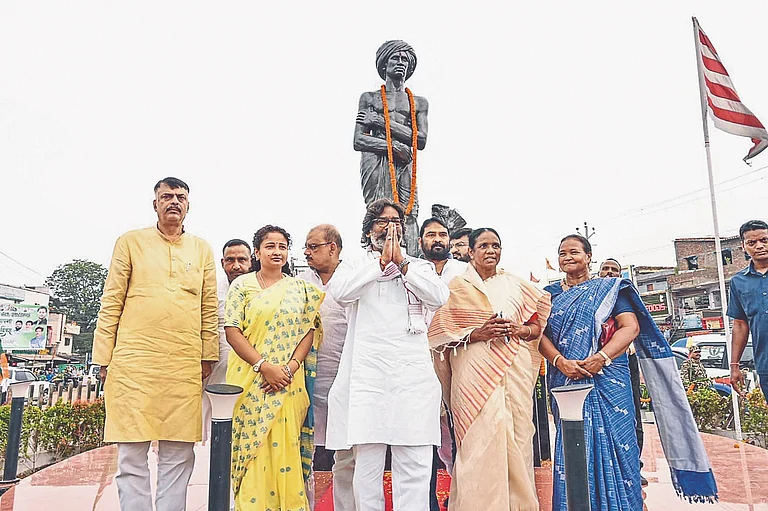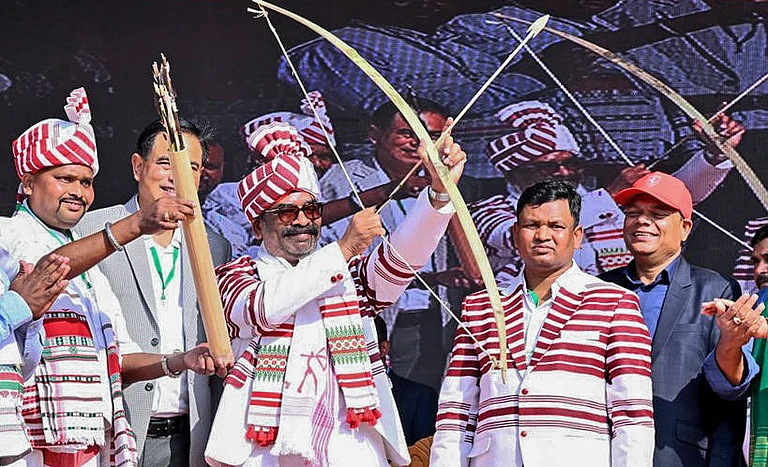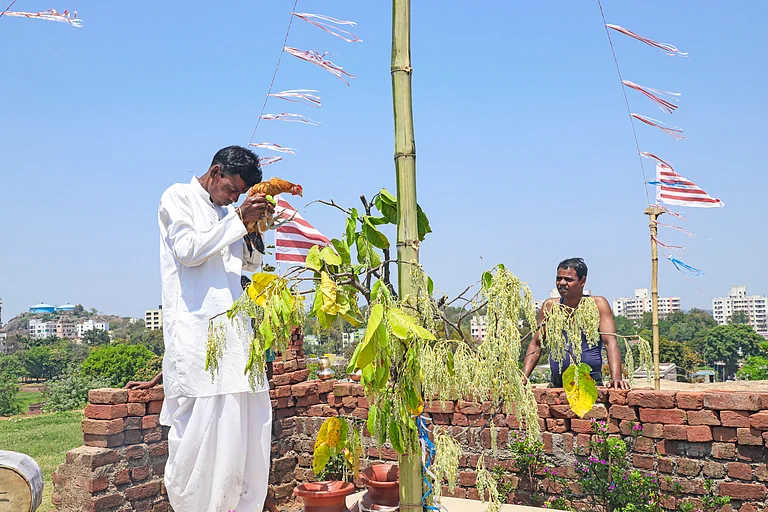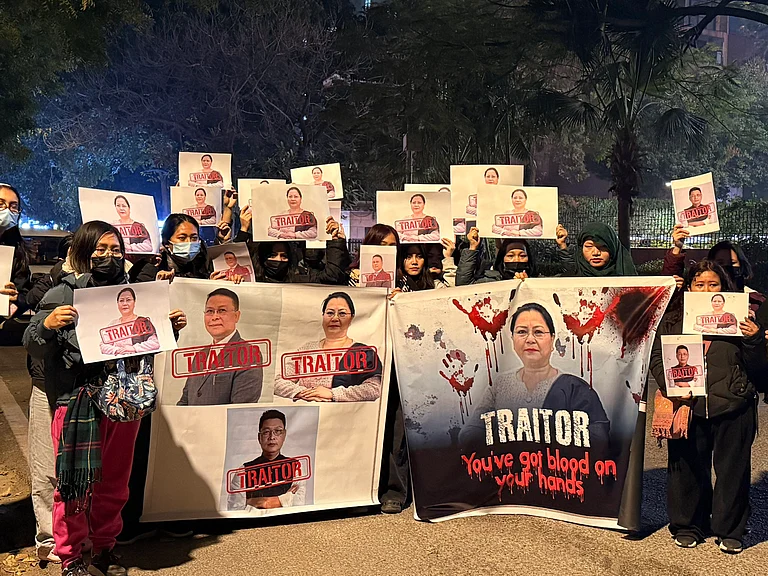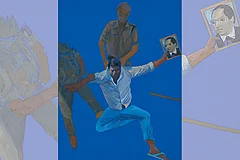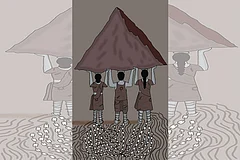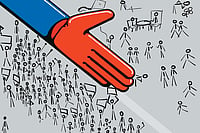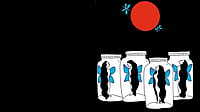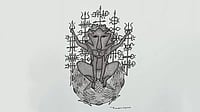Religion is an institution invented by men. Every institution in society is created by them, and also dominated by them. They control power and strength. And their strength derives from violence. The necessity of violence has been justified, variously, in the name of love, peace, religion—really anything at all. The idea that violence is necessary to protect humans from other humans is gradually becoming common, and many ordinary people are buying into the belief that violence is essential for survival. Some consider war is necessary for restoring peace, even when that involves the deaths of thousands of innocent people and leaves multiple generations ravaged and depressed in its wake. All this is born from a dominance-mindset. It is common to hear people say that if we are not ready to attack, then we leave ourselves open to attack from others. This gives every group a justification to increase its strength. But what does this strength really mean? It means an increase in the power or capacity to commit violence. Creating the power to commit violence to resist violence is also part of this. Historian Yuval Noah Harari, writing in his book, Sapiens, about how men established their dominance the world over, says that this was made possible because they increased their ability to inflict violence. Thus their power kept growing until finally they controlled everything. As part of this process, they incorporated, from time to time, the use of new techniques of violence.
Whatever may have been the reason for the emergence of religion, whoever may have started it, whatever need it may have served originally, even if it was started to counter violence, injustice and inequality, in the end, it too has also been turned into a tool of violence. At the hands of a communal and supremacist ideology, religion today has become the biggest weapon to promote one’s own particular religion, to control its adherents, and to attack those who belong to other religions. And all over the world, men are seen spearheading this endeavour. It gets a fillip when religion mixes with politics. Meanwhile, efforts to lead society towards progress are lagging behind.
Ordinary people associate religion with morality. Religion for them is also a thread that connects them to an invisible power in which they can trust, to which they can offload their major worries so as to be able to travel through life a little more lightly, and which offers them a sense of safety and well-being. Their faith in this power gives them the strength to fight adversities, to trust even strangers, and to help each other and stand with each other in happiness and sadness. The locus of this immense, invisible power may be anywhere: a book, a stone, a tree, a statue, or even an abstraction. The trust it inspires ushers a balance in life. It also helps the believers achieve unity and cooperation.
But as the power equations in the country and the world shift, control and dominance are becoming the major purpose of religion. Who wants to control and whom? Powerful people use religion as an opiate for the backward and poor masses, as something that will keep them intoxicated. People living with a perennial sense of insecurity, fear, and inferiority take to religion with the greatest enthusiasm. Most of the religious agenda of the upper class is actualised through the practices of the backward classes. Within them, there exists another layer, which is that of women. Most women from these classes are perpetually engaged in religious activities. Owing to social conditioning effected through several generations, these women come to view participation in religious activities as a very important part of their lives, and the possibility of any direct resistance by them becomes extremely unlikely.
Most of the religious agenda of the upper class is actualised through the practices of the backward classes. Within them, there exists another layer, which is that of women.
Those who occupy the echelons of power, while enjoying their economic freedom, have progressed so far through the latest technologies that they can see that the planet is overburdened and close to a point of crisis. They are also erecting safeguards against future human-made epidemics that would decimate large swathes of populations from the economically weaker sections. The latter, with their weak immunity, would not be able to withstand the blow of major epidemics and will be the first to perish. The tribals’ traditional sources of knowledge, their traditional methods, and the vast reservoir of information and understanding they carry about the herbs and trees in their forests, are dismissed and destroyed by modern education. The devastation of these tribal societies becomes complete when forests are destroyed to make way for mining.
The system that has been put in place is such that our health facilities are accessible to the economically well-to-do on a priority basis, while the weaker sections are forced to perish. No religion or God can protect them in such situations. Their personal decency does not come to their rescue as they fall prey to such large conspiracies. No moral teachings of any religion can keep them safe from the exploitative web woven by the powerful. This means that God is the invention of some human minds and they put it to use according to their own wishes. Religion is a human creation and the powerful use it to maintain their social and economic dominance.
Religious conflict is not seen in tribal societies, largely because these societies are not built on relations of domination and subjugation. Tribal society operates on mutual cooperation and believes in nature-derived values. The main element of its faith is the expression of gratitude. Its festivals are occasions to express gratitude to all the things and creatures that protect the tribals from hunger and sorrow and help them live their life. Even the dead ancestors are thanked for being invisibly connected with nature and taking care of them. By way of thanksgiving, the tribals organise special jatras or fairs for their benefactors, dance and sing with them, cook food for them in the jungle and feed them, and also invite people from other villages to join in. This differs entirely from organised religions. Here, there is no sense of superiority associated with one’s own religion, nor any attempt to belittle other religions. This is the reason why tribals have never insisted on building tall monuments for their ancestors. They celebrate their festivals under the open sky. They do have a small room for the ancestors in their homes for they believe that even though the ancestors are not visible after death, they are with them nevertheless, as part of nature and their family. Apart from the ancestors, the tribals thank clusters of trees, rivers, waterfalls, forests, mountains, the earth, cows, bulls, and buffaloes for their contributions. These are the fundamentals of their faith. Therefore, while there may be disputes among tribals over land, religion is never a major reason for conflict.
Violence in the name of religion paves the way for tighter control over resources by a small group. All this increases the marginalisation of the weaker sections.
Of late, a few organisations have succeeded in sowing the seeds of communal discord even within tribal societies by projecting religion as a big issue. Such elements have also managed to get the tribals mob-lynched in the name of religion, at the hands of communities living around the tribals. Using their politics of hegemony, they have weaponised religion to deepen the subconscious insecurities of the common people; at the same time, they have goaded people to look towards religion and religious organisations for security. A portion of the blame for these developments must also be shared by the secular people who for long have viewed religion as a personal matter, and failed to ensure that there is respect for everyone’s faith and a proper place and security for all faiths to be practised.
At various times, several great men have stood up against violence, injustice and inequality. The ideas preached by some of these men became founts of religions. Today, all such organisations and religions are being appropriated by powerful people with a hegemonic worldview of domination. They use religion to promote injustice and inequality and to secure their own power. It matters little to them if some innocent people get killed in this process. Only by raising public awareness about such misuse of religion and by pursuing resistance against it can we break the morale of the communal folks.
The ideology of dominance is intrinsically linked to the plunder of resources. Violence in the name of religion too paves the way for tighter control over resources by a small group. All this increases the marginalisation of the weaker sections. But is there any upper limit on the amount of resources that these elite need on this earth? A society with a growing gap between the rich and the poor is a sick society, where half the masses are grappling with hunger and unemployment while the other half suffer from depression. We forget that human beings rose above other animals because they displayed an ability to share resources and live in mutual cooperation.
The acceptance of diversity and difference can open a new path, where people live with their different faiths, beliefs, likes and dislikes, and move towards building a society based on cooperation. But for that to happen, we will have to stop locating the meaning of power and strength in violence. Power can also mean caring for each other, standing up for each other’s rights, and making efforts to lessen, if not eliminate, each other’s fears and insecurities. Only then can we reclaim our trust in each other. This may seem difficult, but humans have achieved far more difficult things, including trips to the moon. It is not impossible to create a society of our dreams.
(Translated by Kaushika Draavid)
(Views expressed are personal)
MORE FROM THIS ISSUE
Jacinta Kerketta is a journalist, poet and activist. Her work deals with identity crisis of the adivasi community
(This appeared in the print as 'Men Made Religion')






